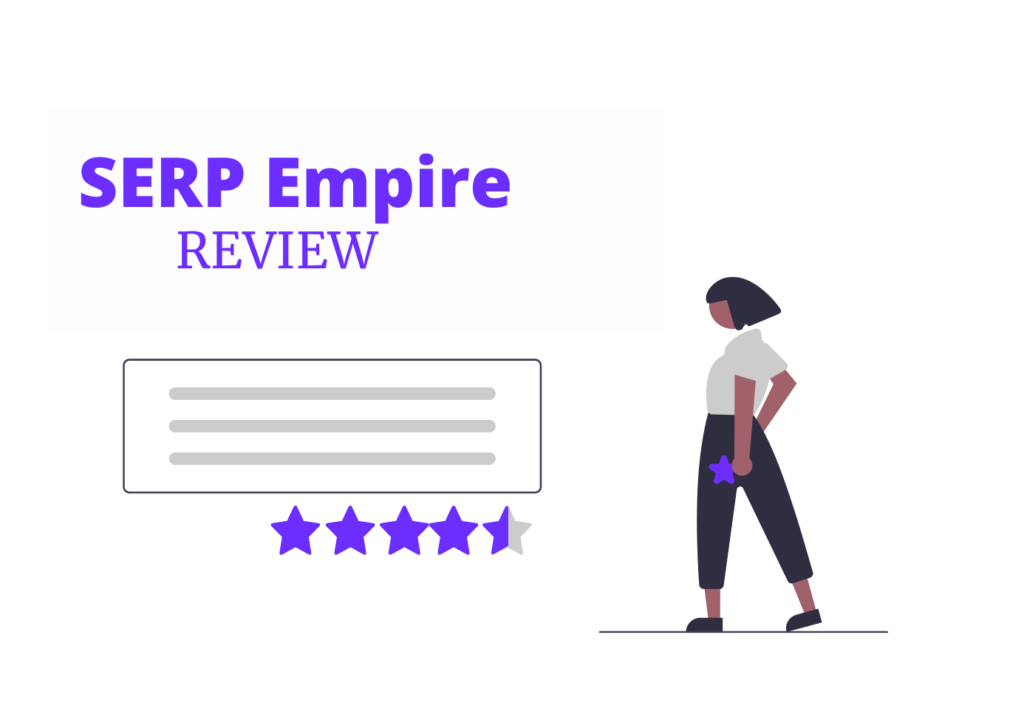Are you wondering how can eCommerce SEO services help you increase your traffic and revenue?
With a compound annual growth rate (CAGR) of 22.1 percent, the global search engine optimization services market is predicted to rise from $51.74 billion in 2021 to $63.19 billion in 2022. This increase is primarily due to the companies restructuring their operations and recovering from the COVID-19 impact, which had previously led to restrictive containment measures involving social distance, remote working, and the closure of commercial activities that resulted in operational challenges. At a CAGR of 20.7 percent, the market is predicted to reach $134.26 billion by 2026.
For eCommerce websites, search engine optimization is low-hanging fruit. Even though SEO offers one of the best ROIs of any eCommerce marketing strategy, many online stores are built with little to no care for search engine optimization.
Instead, many rely on sponsored ads or social media, which may be excellent for businesses but necessitates a steady flow of time and money. Every year, firms spend billions of dollars on advertising, which is only going up. On the contrary, SEO needs a significant amount of work up front, but once you have a high ranking, you may almost make sales without any ongoing expenses.
In this article, I’ll show you how eCommerce SEO services can help boost your website traffic. But first, let’s understand e-commerce SEO and why it is essential.
What is eCommerce SEO?

Your eCommerce website’s exposure in search engine results pages can be improved through eCommerce SEO, which is the process of producing more organic (free) traffic to your website. Optimizing your website’s structure and making technological enhancements are everyday eCommerce SEO tasks.
While eCommerce sites can attract customers through various means, SEO is critical to their long-term success. In the end, there are several ways to improve your store’s search engine visibility. Your eCommerce SEO campaign will get off to the best possible start if you conduct detailed, product-focused keyword research and study your competition. Static, non-product-oriented pages on your site, such as the following, should not be overlooked.
- Homepage
- F.A.Q. page
- Blog articles
- About page
- Help center answers
- Contact page
Create a list of relevant keywords for each page, including any other relevant ones. You may easily search for a long-tail keyword and locate related semantic keywords using tools such as SE Ranking (the best value for money out there right now).
Why Does SEO For eCommerce Matter?

If they need a product or service, how do consumers go about getting it? Many people use Google. The information they seek will assist them in making well-informed decisions, such as suggestions, comparisons, and other data.
If you don’t appear in the search results, you miss out on many potential customers. Even if your products have a home on the internet, can people locate them?
Here comes eCommerce SEO to the rescue! It allows you to reach your intended audience without paying for advertising. Your high-quality products, compelling text, and compelling calls to action can delight your visitors once they arrive at your site. You’re doing a disservice to your business if you focus solely on user experience optimization for your website. To acquire new consumers, the first step in the process is to get them there in the first place.
You might want to read next:
How can eCommerce SEO services boost my website traffic?

Online SEO services aim to attract the correct kinds of customers to a store’s website, increasing qualified leads and optimizing website traffic for a better return on investment.. You will need more qualified leads for a better return on investment. As a result, successful E-Commerce SEO services focus on attracting the proper customers.
SEO services for e-commerce include:
#1. Identifying the keyword.
Researching keywords and phrases that are related to your e-commerce store is called keyword research. In addition to your products and services, this includes your offerings. Any SEO plan that hopes to be effective must start with thorough niche keyword research. The terms will influence the subsequent optimization attempts you identify in this stage.
Keywords can be broken down into two main categories:
- How-tos and tutorials are examples of informational content that people search for using these terms. If you have a blog on your eCommerce site, these are the keywords you should be targeting.
- On the other hand, commercial content is when people search to buy a product. If you have an e-commerce website, these terms should be the foundation of your search engine optimization plan.
Choosing the Best Keywords to Use.
Research the most popular search terms consumers use to look for your items to locate the best keywords to target. Google’s auto-suggestions and ‘people also ask’ capabilities can help you identify relevant keywords. You can see which terms are the most popular by looking at these. It’s also possible to observe your successful rivals’ SEO strategies and learn from them by looking at the vocabulary they use.
Both Amazon and Google are the most popular search engines for those looking to buy things online. Consider Amazon’s keyword strategy as a model for your own. Amazon is a great place to search for keywords that describe your products. As a result, Amazon will provide relevant product recommendations based on the terms you typed in.
Your clients will be searching for these terms, so they’re an excellent place to start when developing an effective search engine optimization plan. In addition, you’ll see a trend toward long-tailed keywords, which are less popular.
I suggest you check my thorough guide to niche keyword research, where you’ll learn how to look for the right keywords.
Keyword Research Tools
It’s an excellent place to start, but it isn’t the only location where you can conduct keyword research. Plenty of high-quality solutions are out there to help.
You may then utilize Ads History to see if these terms have previously been used in paid search campaigns. When an advertisement uses a keyword, you can see how much traffic it produces. You can use this to get an idea of how much interest there is in the keywords you’re thinking about using.
Finally, you can utilize “Keyword Difficulty” to assess how difficult it will be to outrank the pages that are now provided for each keyword. Search for “untapped keywords” when selecting the right ones for your campaign’s keyword research strategy wherever possible. Search volume and competition for these terms are both reasonable, making them ideal for generating the possible return on investment (ROI). Your industry’s specific definition of high search volume may be different.
You might want to read next:
#2. Implementation of keywords.
The next step in our procedure is to include these high-value and pertinent keywords in your website’s content. These keywords are utilized in a variety of contexts by our eCommerce SEO specialists, including the following:
- Homepage
- Meta descriptions
- Image alt text
- Page titles
- Product descriptions
- Image alt text and more
This stage is critical to the success of an SEO strategy for an online store. It will be difficult for search engines and users to determine that your website is relevant to a search query if it has not been optimized for the appropriate keywords. Even while you can conduct your own copywriting to integrate these suggested keywords, working with a full-service digital marketing agency that also provides SEO copywriting services is advantageous.
#3. Optimizing product page.
Arguably, the most important sites to rank are those about products and categories. If someone finds them using Google, they will immediately have access to all of your products that fall under that category. For these pages to be optimized appropriately, you will need to include your target term in the following locations:
In the URLs
Put your main keyword in the URL, and you’ll probably see an increase in traffic. It’s essential for websites in highly competitive niches because optimized URLs provide you an advantage over your rivals in driving more visitors. This is very crucial. You can also alter them to reflect the most effective keywords for boosting your position on the category pages.
In the image alt text.
For Google to understand what an image is and contains, alt text must be provided. Using picture alt text is a great way to include your keyword on the page and improve your chances of appearing in image search results.
In body copy.
Regarding the body copy, things get a little more complicated. Most category pages skip the introduction and move straight to the products, which is not ideal for search engines like Google. It is recommended that you aim for an introduction that is at least 300 words long and includes your keyword at least once.
In the title tag (H).
The keyword should be positioned as close to the beginning of the H1 tag (also known as the page title tag). This will help you rank organically for the title tag and promote the core ideas of the page you are working on.
In the metadata.
A higher click-through rate (CTR) correlates positively with higher rankings. Thus it is possible that putting your keyword in your metadata will have a positive impact on your search engine positioning (SERP). Because Google bolds your primary term in your meta description and description tags, it’ll stand out in search results.
Repeat the process for each category page, and then do the same for each product page.
You might want to read next:
#4. User Experience.
Enhancing the user experience is an essential component of eCommerce SEO. Your website must be simple to use, even if it sells many things. Ensure that each top-level page has a link from your menu and that the sections or categories on each page are acceptable. It’s also crucial that your navigation is simple to use and comprehend.
When visitors come to your site, they may be unable to locate what they’re looking for, which might make them leave. This can cause a higher bounce rate, which is not good. In other words, a high bounce rate tells search engines that your website isn’t as relevant as it appears for the search terms it is ranking for. eCommerce SEO relies heavily on web and landing page design; thus, paying attention to these aspects of your site is essential.
Also, breadcrumb navigation is a great way to boost your eCommerce site’s optimization of search engines. There are little links at the top of a menu, category, or product page called “breadcrumbs.” On a website, a trail of breadcrumbs leads you back to where you started.
#5. Optimize your snippets.
The snippet is the text that appears in Google’s search results when someone searches for your website’s URL. If you want to improve the snippet of a page, we propose employing an SEO plugin to do the following things.
The meta title.
When it comes to the content of a web page, Google pays close attention to the meta title, also called the title tag. Search engine users are likelier to follow through on a link they see in the search results if the headline is valuable and attention-grabbing. The product or page title does not have to match the meta title.
Meta Description.
There should be no more than 150 characters in the meta description. Also, it is vital to include your primary keyword here. You could also use catching keywords such as “low rates” or “free shipping” as enticements in your search results to get visitors to click on them. But avoid clickbait and only use keywords that really reflect what is inside.
Slug of the URL.
Another technique to provide search engines with relevant contextual data is to use this method. As the number of subcategories grows, the URL slugs created by e-commerce sites might become more complicated. To make your URLs as simple as feasible, shortening them and sticking only to keyword URLs is a good idea.
Structured Data.
Explore the worlds of rich fragments as well. Google uses these snippets to display more detailed results on its search results page. They can come in the form of testimonials, star ratings, hours of operation, menus, and other information.
#6. Marketing.
Activities that contribute to Off-page SEO and those that contribute to On-page SEO assist in creating the business’s reputation. Activities related to marketing through social media, such as promoting online reviews, guest blogging, and other forms of online promotion, are all helpful in gaining excellent traction.
You might want to read next:
Conclusion
The SEO value of your website can be an albatross or an asset for your organization, and you should do everything you can to improve it. Hopefully, you now have a clearer picture of how eCommerce SEO works and how it may assist your business. Use this information and these methods in your plan as soon as possible. You may be shocked by the return on investment and the impact it has on the future of your store if you do it correctly or hire pros to do it on your behalf.
Vaibhav Kakkar is the Founder and CEO of Digital Web Solutions, a globally trusted agency with a full suite of digital marketing services and development solutions. Vaibhav believes in building systems over services and has helped scale up agencies from scratch to niche-leaders with million dollar turnovers.

RELATED CONTENT




